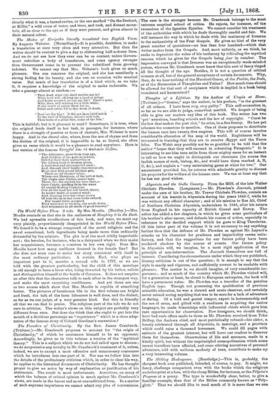Abyssinia and the Galles Country. From the MSS. of the
late Walter Michele Plowden. (Longman.)—Mr. Plowden's Journals, printed under the care of his brother, Mr. Trevor Michele Plowden, contain an account of his travels in Abyssinia during the years 1843-7, while he was without any official character ; and of his mission to Ras Ali, Chief of Northern Christian Abyssinia, undertaken in 1848, after his return: from England in his capacity of British Consul and Envoy. The editor has added a few chapters, in which he gives some particulars of his brother's after career, and defends his course of action, especially is reference to the decided support which he gave to King Theodorns. Of this latter part of the volume it is not necessary to say anything farther than that the defence of Mr. Plowden as against Mr. Layard's attacks on his character for prudence and impartiality seems satis- factory, and that the suggestions for our future policy have been: rendered obsolete by the course of events. Our future policy in Abyssinia will, we imagine, be a most rigid application of the principle of non-intervention. The Journals themselves are fall of interest. Considering tho circumstances under which they are published,. literary criticism is out of the question ; it is enough to say that the style is manly and vigorous, and sufficiently correct to be readable with pleasure. The matter is, we should imagine, of very considerable im- portance ; and as much of the country which Mr. Plowden visited will, for a generation at least, be closed to European enterprise, the book will have a permanent value. Mr. Plowden was a traveller of the genuine English typo. Though not possessing the qualification of previous scientific education, he was a shrewd and acute observer, and certainly never missed seeing anything that was to be seen for a lack of adventure- or daring. Of a bold and genial temper, expert in horsemanship and the use of arms, and gifted with a readiness in acquiring the native languages, he made friendships with influential chiefs which gave him, rare opportunities for observation. Few foreigners, we should think, have had such offers made to them as Mr. Plowden received from Toko. Brillay, the Amhara chief, and most patriotically refused—his sister, beauty celebrated through all Abyssinia, in marriage, and a province which could raise a thousand horsemen. We could fill pages with extracts of the greatest interest, but will leave our readers to disoover them for themselves. Observations of life and manners, made in a kindly spirit, but without the unprincipled cosmopolitanism which some recent travellers have affected, and some stirring narratives of personal adventure, told with uniform modesty of tone, contribute to make up. a very interesting volume.






























 Previous page
Previous page